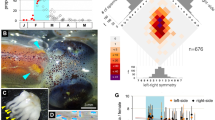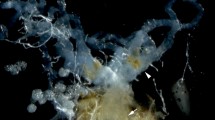Abstract
Coris julis L. and C. giofredi Risso have long been regarded as separate species, although Steindachner1 claimed julis to be the male and giofredi the female individuals of the same species. In the Bay of Naples Lobianco2 found mature male and female individuals both in C. julis and in C. giofredi and therefore rejected Steindachner's hypothesis of sexual dimorphism in Coris.
This is a preview of subscription content, access via your institution
Access options
Subscribe to this journal
Receive 51 print issues and online access
$199.00 per year
only $3.90 per issue
Buy this article
- Purchase on Springer Link
- Instant access to full article PDF
Prices may be subject to local taxes which are calculated during checkout
Similar content being viewed by others
References
Steindachner, F., Sitz. K. Akad. Wiss. Wien, 57, 701 (1868).
Lobianco, S., Mitth. Zool. Stat. Neapel, 19, 513 (1909).
D'Ancona, U., Experientia, 5, 381 (1949).
Bacci, G., Pubbl. Staz. Zool. Napoli, 26, 110 (1955).
Author information
Authors and Affiliations
Rights and permissions
About this article
Cite this article
BACCI, G., RAZZAUTI, A. Protogynous Hermaphroditism in Coris julis L.. Nature 181, 432–433 (1958). https://doi.org/10.1038/181432b0
Issue Date:
DOI: https://doi.org/10.1038/181432b0
This article is cited by
Comments
By submitting a comment you agree to abide by our Terms and Community Guidelines. If you find something abusive or that does not comply with our terms or guidelines please flag it as inappropriate.



